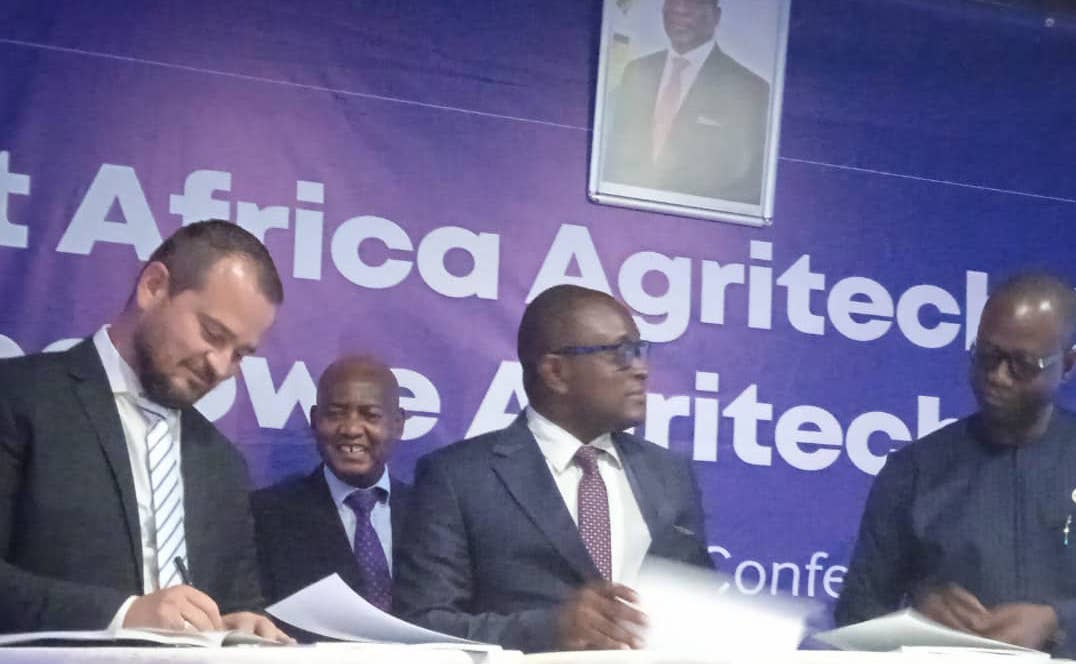|
Getting your Trinity Audio player ready...
|
The government is working on mainstreaming information communication technologies (ICTs) into agriculture and to achieve this, it has developed the Zimbabwe Agri-Tech Strategy to leverage innovations to improve efficiency, increase effectiveness, reduce costs and enhance the competitiveness of the sector.
In his remarks delivered on behalf of the minister, Hon Vangelis Haritatos, the Deputy Minister of Lands, Agriculture, Fisheries, Water, and Rural Development speaking during the launch of the Zimbabwe Agri-tech strategy today, said the implementation of the strategy requires a reliable and accurate agriculture information system for measuring progress towards food security, assessing import substitution, evaluating foreign currency generation, and undertaking an inventory of value addition and beneficiation.
He said the strategy will be implemented through the Integrated Agriculture Information Management System.
“Agriculture is increasingly knowledge-intensive. Therefore, having access to the right information, at the right time, at the right format, and through the right channel can make a critical difference to the livelihoods of stakeholders involved in agriculture as we push to improve our farmers’ productivity, production, and profitability,” Hon Haritatos said.
Dr. John Basera, the permanent secretary in the same ministry said modern large-scale agriculture has to be enhanced by technologies such as precision agriculture tools like a global positioning system (GPS), artificial intelligence (AI), Internet of Things (IoT), blockchain satellite, and drone monitoring.
Dr. Jenfan Muswere, the Minister of ICT, Postal and Courier Services said embracing ICTs in agriculture is in sync with the government’s 2030 vision of achieving an upper-middle-oncome economy. He said it also increases food productivity hence ensuring food security.
Mr. Lacina Kone, the Chief Executive Officer of Smart Africa, paid tribute to Zimbabwe for developing the “AgriTech Blueprint for Africa”.
“This Blueprint, under the leadership of Zimbabwe, was adopted by all Member States of the Smart Africa Alliance and officially launched during the last Smart Africa Board meeting on November 10, 2021. The Blueprint aims at improving the lives of the smallholder farmers within rural and peri-urban communities through better utilization of Information Communication Technologies (ICTs) in the agricultural value chain.
“The aim is achieved through harmonization of regulatory and policy framework and proffering strategic recommendations for the African Member States to create national and cross-border pilots in AgriTech in Africa. This creates immense potential for Africa to pull communities out of poverty and also to guarantee food security for our growing population. In order to achieve this, Africa must embrace technology and countries must develop National Agritech strategies like the strategy we are launching here today,” Mr. Kone said.
Zimbabwe is championing the Agritech flagship project in the Smart Africa Alliance. Zimbabwe has traditionally been renowned as the breadbasket of Africa and is now taking the lead in Agritech.
Hence, with the support from the Norwegian Agency for Development Cooperation (NORAD), Mr. Kone said stakeholders will develop and implement the first AgriTech pilot under the blueprint and national Strategy in Zimbabwe, which is meant to digitalize the farming ecosystem and improve evidence based decision making for governments and farmers.
Smart Africa is an alliance of 32 African countries representing over 815 million people, international organisations, and global private sector players tasked with Africa’s digital agenda.
The alliance is empowered by a bold and innovative commitment by African Heads of State to accelerate sustainable socioeconomic development on the continent through the use of Information Communication Technologies. With a vision to transform Africa into a single digital market by 2030, the Smart Africa Alliance brings together Heads of State who seek to accelerate the digitalization of the continent.
Through Smart Africa, Africa is aiming to bring about sustainable development, enable a cashless economy, increase citizen participation, increase production, productivity and efficiency, increase transparency, trust, and accountability, increase evidence-based decision making, create jobs, especially for the youth.
Agriculture in Zimbabwe in particular, represents close to 17%. In general, Africa has a massive social and economic footprint. It is by far the single most important economic activity in Africa. It provides employment for about two-thirds of the continent’s working population and contributes an average of 23 percent of GDP in Sub-Saharan Africa and about 30 percent of the value of exports.






